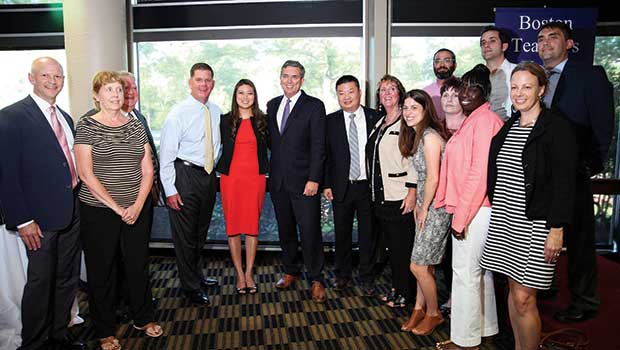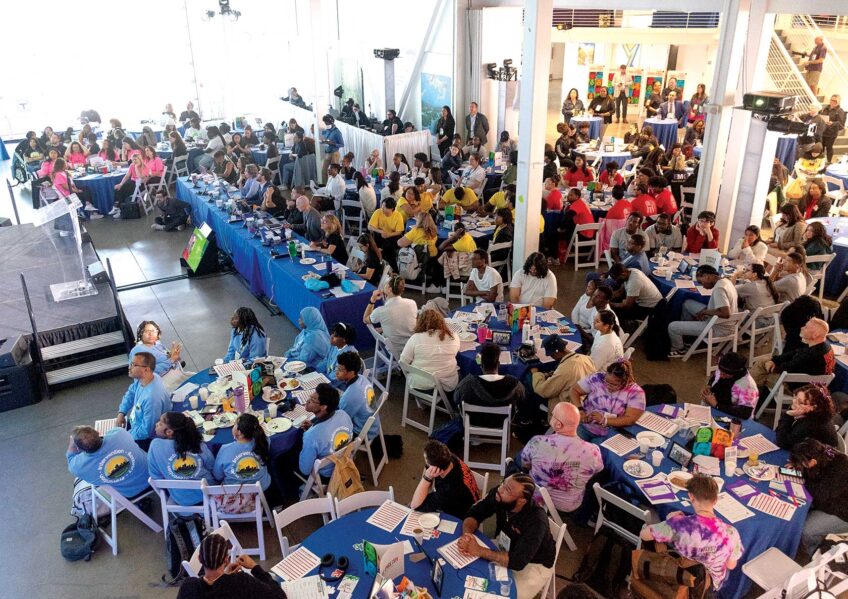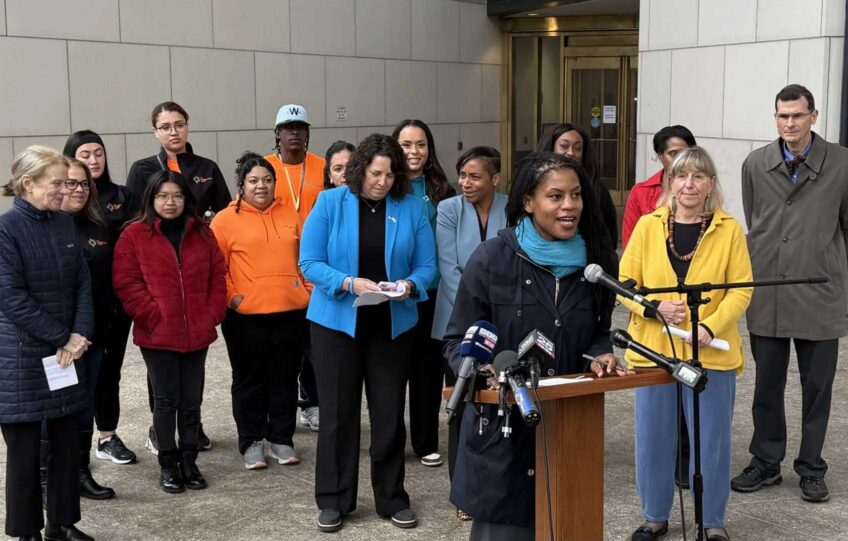Boston Teachers Union gets a contract
Tentative agreement reached after 18 months of negotiation

After contract negotiations that dragged on for a year and a half, members of the Boston Teachers Union and city officials have reached a tentative agreement. Mayor Martin Walsh and the heads of the BTU, Boston Public Schools and Boston School Committee made their announcement last Thursday during an event at Boston University.
Not all points of contention are put to rest in the contract, but officials said it was important to settle what they could now and begin the school year with a contract in place.
A major element of the agreement is increased paraprofessional staffing. BPS will hire additional substitute paraprofessionals who can provide one-on-one support to high-needs students or teach them in substantially separate environments, according to a BPS spokesperson. Another piece of the agreement ensures that in times of layoffs and other staffing flux, positions serving students with autism or emotional needs remain held by paraprofessionals who have specific expertise in those areas, instead of going to those with seniority, said a BPS official.
Jessica Tang, BTU president, praised the agreement.
“I am thrilled we were able to come to an agreement and it was great to work with everyone and think of how we could get to ‘yes’ with supporting our students,” Tang said. “The agreement prioritizes and improves upon key supports for our students and will help to attract and retain highly-qualified teachers.”
Other elements of the agreement include a pay raise, expanded eligibility for parental leave, minimum school nurse staffing standards, more flexible hiring processes and new faculty focused on implementing restorative justice discipline practices. The contract has a relatively short span, only two years — this past year, retroactively, and the coming year until September 2018. The prior contract had a six-year scope. Officials said discussion would continue on the unresolved items.
Before going into effect, the agreement must be ratified by the BTU and approved by the Boston School Committee. It goes before the Committee in early September.
The Boston Teachers Union represents 10,000 members, including teachers, paraprofessionals, social workers, nurses, librarians and related service providers, Tang said. Members have been working without a contract since August 2016.
Staffing, tests and conflict resolution
Educators and city officials have agreed to establish a minimum standard per-school nurse staffing level. The minimum is set at 0.5 nurses per school, meaning that each school has a full-time nurse spending at least half of his or her time on site, although how those hours are allocated is flexible. Most schools already have above minimum staffing, a BPS spokesperson said, but this is the first time the contract states a per-school standard that must be maintained regardless of individual student population size. This standard will be implemented in 2018-2019, while BPS commits to hiring additional nurses during the 2017-2018 year.
Also under the contract, three schools will receive a full-time faculty member dedicated to implementing restorative justice practices, which are aimed at mediating discipline cases by helping students identify and reflect on the causes and impacts of misbehavior and make up with those they have harmed. The district also will appoint a restorative practices coach to coordinate with the on-site faculty and central office and to organize professional development.
Another item: Tang said many BTU members are concerned about over use of punitive, high-stakes testing. In order to find better alternative assessment measures, the parties agreed to establish a joint labor commission on the topic, which will include students, parents, union members and district leaders.
Kindergarten class sizes are among the debated items not resolved in this agreement.
Pay and benefits
Pay had been one major sticking point, but now both parties have agreed to a 2-percent pay raise that will retroactively apply to this past year, and a 3-percent pay raise applied to this year. Bachelor’s-degree-holding paraprofessionals working toward a master’s degree will see salary boosts after completing a certain number of credits, BPS Superintendent Tommy Chang said.
The BTU also had fought to grant early-career teachers access to the paid parental leave policy. Now teachers and paraprofessionals in their second and third years will be eligible. A class of professionals known as applied behavior analysts, who have been seeking to join BTU for a while, now will become part of the union, Tang said. Additionally, some money held in the teacher leadership fund will be redirected toward supporting educators who wish to implement innovative practices or hold best practices hearings.
Hiring process
Under the contract, BPS will be freer to hire outside its current pool of teachers and paraprofessionals to fill openings. Currently when filling a post, principals must select from a list of candidates already in the system, and can bypass internal applicants only if the job requires a special skill — and then must pay the new hire an extra bonus for that skill, amounting to a $1,250 stipend. The agreement drops this requirement, and with it, drops the stipend pay, thus saving half a million dollars, BPS officials estimated. Paraprofessionals and teachers also can now be hired earlier in the school year, a practice credited with bringing in high-quality educators.
One unresolved piece is how to handle tenured teachers who do not receive placement in a classroom of their own. While they wait for assignments, they continue to be paid and tend to take on support roles. Then-BTU president Richard Stutman told the Banner in March that the union wants assurances that any of these unassigned but highly-rated teachers — those who have been rated as “proficient” or “exemplary” — quickly receive full-time roles. Meanwhile, BPS has sought the right to terminate such unplaced teachers.
Long time coming
Tensions over the prolonged negotiations flared earlier this year as BTU members in March accused the city of sexism for quickly signing a new contract with the male-dominated police unions, while talks with the female-dominated BTU stretched on. The union sought an intervention by the state mediators to spur a faster conclusion to discussions.
With an agreement now tentatively reached, members of the negotiating parties expressed optimism.
“I’m really encouraged by the direction this contract is pointing,” Melanie Allen, a BTU contract negotiating team member, parent, and Hernandez K-8 School teacher, told reporters. “Schools will have nurses and cleaner facilities. My kids … will be in a place that does not emphasize over-testing and does emphasize restorative justice. This is the kind of school I want my child to go to.”






